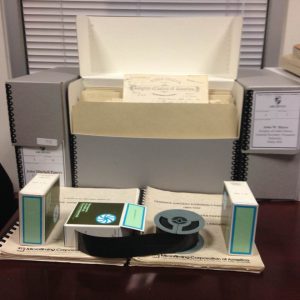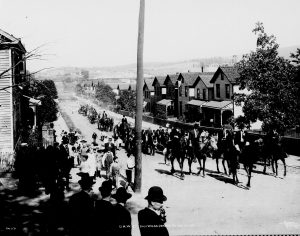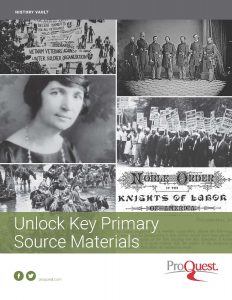
The papers of Terence V. Powderly, John W. Hayes, and John Mitchell, three Gilded Age and Progressive Era labor leaders of national importance are now available online in digital format thanks to a partnership between The Catholic University of America (CUA) and ProQuest’s History Vault subscription service. Securing collections of notable Catholic labor leaders like Mitchell, Powderly, and Hayes was facilitated at CUA in the 1940s by labor priests, John A. Ryan, Francis J. Haas, and George G. Higgins, all of whose papers reside in the university’s archives. There were some advances in accessibility via microfilming in the 1970s and more recently with the creation of detailed finding aids and digital collections via the Washington Research Library Consortium (WRLC) of Powderly and Mitchell photographs since 2001. However, the current ProQuest digitization project, based on scanning the microfilm, culminates over seventy years of archival outreach.

Powderly, subject of a previous blog post, was the son of Irish immigrants, born in Carbondale, Pennsylvania, in 1849. He joined the International Union of Machinists and Blacksmiths in 1871 and the Scranton, Pennsylvania, Local Assembly of the Knights of Labor in 1876, where he rose to national leadership as Grand (later General) Master Workman, 1879-1893. He was also a progressive mayor of Scranton, 1878-1884. From 1897-1901, he was Commissioner General of Immigration, and thereafter held several other federal immigration or labor posts. After his death in 1924 Powderly’s papers were retained by various family members until his niece, Mary, donated them in 1941 to CUA through the influence of Msgr. Haas. They richly detail the organization of labor, immigration policy, and political patronage in late nineteenth and early twentieth century America. The correspondence and reports are treasure troves of primary source material while the photographs and lantern slides display a wealth of cultural imagery and geographical landmarks. The microfilming project of 1974 (94 reels) was funded by the Microfilming Corporation of America and edited by John A. Turcheneske, Jr.

John William Hayes was born in 1854 in Philadelphia to Irish immigrants. Working as a brakeman he lost his right arm in a railroad accident in 1878 and thereafter learned telegraphy. He joined the Knights in 1874, was elected to their General Executive Board in 1884, and became General Secretary Treasurer in 1888. He worked closely with Powderly until 1893 when Hayes joined with the socialists and populist agrarians to oust Powderly from leadership. Hayes remained in control of the fading Knights, who were losing out to the American Federation of Labor (AFL), first as General Secretary-Treasurer until 1902, then as General Master Workman until the closure of the Knights headquarters in Washington in 1916. The Hayes Papers (49 boxes; 24.5 linear feet) were donated to CUA by his family in 1943, the year after Hayes died, and are almost equally divided between official Knights of Labor correspondence and his personal affairs. They were microfilmed (15 reels) together with the Powderly Papers in 1974.
Mitchell, also subject of a previous blog post, was the legendary leader of the United Mine Workers of America (UMWA), born 1870 in Braidwood, Illinois. Orphaned at an early age, he worked as a coal miner. He was first a member of the Knights of Labor and then, successively, legislative agent, organizer, vice president and president of the fledgling UMWA. His leadership in Anthracite Coal Strike of 1902 resulted in significant gains for coal miners and greater recognition for the UMWA. Mitchell was also vice president of the American Federation of Labor (AFL) and member of various national, state, and local civic organizations. He died in 1919 and is buried in Scranton, Pennsylvania. In 1942, Msgr. Haas contacted the Mitchell children and arranged for their father’s papers to be donated to the university. They include correspondence and meeting minutes regarding such watershed issues as standardized wages, safe working conditions, and collective bargaining. The Mitchell Papers, sans most clippings and many photographs, was microfilmed (55 reels) and a printed guide prepared by editor, John A Turcheneske, Jr., in 1975.

ProQuest is well known in educational circles for curating an archive of billions of vetted, indexed documents connected via a variety of research communities. The ProQuest History Vault debuted in 2011 and is constantly adding new documentation of widely studied topics in American history. A particular strength is social movements, especially racial justice, women’s rights, and organized labor. The collections, with enhanced search features, can be purchased as a perpetual archive or as a subscription, providing research access for students and faculty to materials held at geographically dispersed archives. The Powderly, Hayes, and Mitchell papers are part of the module, ‘Labor Unions in the U.S., 1862-1974: Knights of Labor, AFL, CIO, and AFL-CIO,’ which include collections from the University of Maryland and the Wisconsin Historical Society. Because the History Vault digitization project scanned the 1970s microfilm, portions of the Powderly and Mitchell papers are not represented. Files deemed duplicative or unprocessed, but also printed materials and photographs that did not show up well on microfilm, were omitted. The non-microfilmed portions are so noted on the Powderly and Mitchell finding aids and remain open to traditional archival research, as is also the case with all the original materials. Additionally, and as mentioned above, many Mitchell and Powderly photographs are freely available online via WRLC.
For more information on ProQuest History Vault, visit the ProQuest History Vault webpage.
